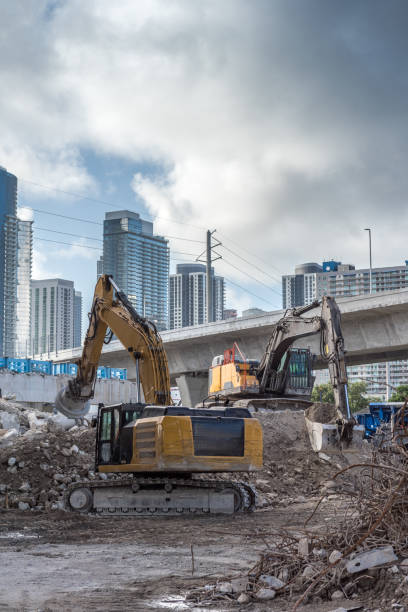When it comes to hiring a commercial demolition contractor, planning isn’t just a helpful step—it’s essential.
You need to clearly outline your project requirements, evaluate contractor qualifications, and anticipate potential risks.
Without a solid plan, you might find yourself facing unexpected challenges that could derail your project and inflate costs.
So, what are the specific elements you should consider to ensure a smooth demolition process?
Understanding these factors can make all the difference in achieving your project’s goals.
Understanding Project Requirements
Before embarking on any demolition project, it’s crucial to clearly define your project requirements. This ensures a smooth and successful execution.
Scope of Work:
- Identify structures to be demolished: Clearly outline the structures or areas that require demolition.
- Establish a realistic timeline: Set a realistic timeline for the project, taking into account factors such as the scope of work and potential challenges.
- Determine necessary permits and regulations: Research and identify any required permits, licenses, or environmental regulations.
Safety Considerations:
- Assess potential hazards: Identify potential hazards such as asbestos, lead, or other hazardous materials.
- Develop safety protocols: Implement appropriate safety measures, including the use of personal protective equipment (PPE) and adherence to safety guidelines.
- Ensure safe disposal of hazardous materials: Plan for the safe and environmentally responsible disposal of any hazardous materials.
Budget Constraints:
- Determine your budget: Set a realistic budget for the entire demolition project, including labor, materials, equipment, and unforeseen costs.
- Account for potential contingencies: Include a contingency fund to accommodate unexpected expenses or challenges.
- Regularly monitor and track expenses: Keep a close eye on project expenses to ensure they stay within budget.
Desired Outcomes:
- Define project goals: Clearly define your desired outcomes for the demolition project.
- Consider future use of the site: Determine how the site will be used after demolition.
- Use project goals to evaluate contractors: Use your desired outcomes as a key factor in evaluating potential contractors and their proposals.
By carefully defining your project requirements, you lay a strong foundation for a successful and efficient demolition process.
Evaluating Contractor Qualifications
Choosing the right demolition contractor is crucial for a successful and stress-free project. Here’s a breakdown of key factors to consider:
Experience and Expertise:
- Relevant Experience: Prioritize contractors with proven experience in pool demolition specifically.
- Project Portfolio: Review their portfolio to assess the scope and complexity of past projects they’ve undertaken.
- Specialized Knowledge: Look for contractors with expertise in dealing with unique challenges, such as dealing with pool liners, coping stones, and underground utilities.
Licensing and Insurance:
- Verify Licensing: Ensure the contractor is properly licensed and insured to operate in your area.
- Check Insurance Coverage: Verify they have adequate liability insurance and workers’ compensation coverage to protect you from potential liabilities.
Client References and Testimonials:
- Request References: Obtain references from previous clients and contact them to inquire about their experiences.
- Read Online Reviews: Check online platforms like Google Reviews, Yelp, and industry-specific websites for client feedback.
Safety Practices:
- Safety Record: Inquire about the contractor’s safety record and any incidents or accidents they may have experienced.
- Safety Training: Verify that the contractor’s team undergoes regular safety training and follows industry best practices.
- Use of Safety Equipment: Ensure they utilize appropriate safety equipment and adhere to all safety regulations.
Team Qualifications:
- Experienced Crew: Assess the qualifications and experience of the demolition crew.
- Proper Training: Ensure the crew is adequately trained and equipped to handle the specific challenges of pool demolition.
By carefully evaluating these factors, you can select a qualified and reliable contractor who will ensure a safe, efficient, and successful pool demolition project.
Mitigating Risks and Challenges
Thorough planning and risk mitigation are crucial for a successful commercial demolition project.
Comprehensive Site Assessment:
- Identify Potential Hazards: Conduct a thorough site assessment to identify potential hazards such as asbestos, lead, mold, or unstable structures.
- Develop Mitigation Strategies: Develop and implement strategies to mitigate these hazards safely and effectively.
Robust Safety Program:
- Safety Training: Ensure all workers undergo comprehensive safety training and are equipped with appropriate personal protective equipment (PPE).
- Emergency Preparedness: Establish clear emergency response plans to address any unforeseen incidents.
- Regular Safety Inspections: Conduct regular safety inspections to identify and address any potential hazards.
Environmental Considerations:
- Waste Management Plan: Develop a comprehensive waste management plan to ensure proper disposal of debris.
- Recycling and Reuse: Explore opportunities for recycling and reuse of demolition materials to minimize environmental impact.
- Compliance with Environmental Regulations: Ensure compliance with all applicable environmental regulations and permits.
Contingency Planning:
- Anticipate Potential Challenges: Identify potential challenges such as unexpected structural issues, weather delays, or equipment failures.
- Develop Contingency Plans: Develop and implement contingency plans to address these challenges effectively and minimize disruptions to the project timeline.
Clear Communication and Coordination:
- Regular Updates: Maintain open communication with the contractor and all stakeholders throughout the project.
- Address Concerns Promptly: Address any concerns or issues promptly to prevent delays and maintain project momentum.
By proactively addressing potential risks and challenges, you can significantly improve the safety, efficiency, and overall success of your commercial demolition project.
Thorough planning is paramount when hiring a commercial demolition contractor. By carefully understanding your project requirements, evaluating contractor qualifications, and proactively mitigating potential risks, you can ensure a smooth and successful demolition process.
A well-defined plan, coupled with the expertise of a qualified contractor, minimizes the risk of delays, cost overruns, and safety hazards. By investing time in thorough planning, you lay the foundation for a successful project that meets your goals and exceeds your expectations.

